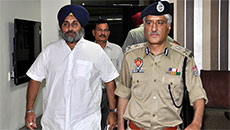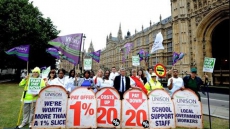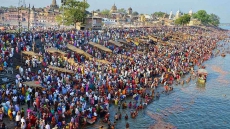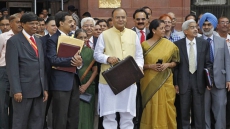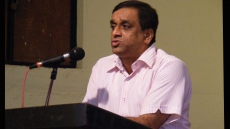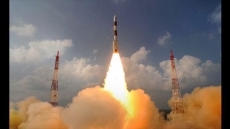Over a decade after Atal Bihari Vajpayee relinquished power -- and in many ways withdrew from public life -- after an electoral defeat that his party never foresaw but he seemed to have, the present government is seeking to appropriate his legacy by hailing him as an icon of good governance -- and may even confer on him the Bharat Ratna, the nation's highest honour.
There is little doubt that Vajpayee was one of the country's most popular and effective leaders, who was acceptable to parties across the ideological spectrum, and did not hesitate to reach out to his political and ideological foes and strategic rivals if the larger good warranted it.
His three-term prime ministership -- in 1996 and between 1998 and 2004 -- gave him the longest tenure for a non-Congress leader and etched his name in history for his ability to defy the dominant West-led global regimes to become a nuclear power and mark India's presence at the global high table.
He gave stability to Indian politics, gave respectability to political coalitions - "Coalition governments have their own dignity. History will not forgive those who try to sabotage national interests" -- by demonstrating their ability to subsume ideological differences for a larger cause, reached out to Pakistan, rebuilt bridges with the US and other world powers despite their withering criticism of India's nuclear tests, and put moderation in politics as a foundational principle above political adventurism.
But what would go down in history -- and this is often glossed over by his legacy-stealers -- is the way he sought to distance himself from the BJP's radicalism, when he termed the party's Ayodhya action in demolishing the Babri Masjjid as the "worst miscalculation" and a "misadventure" and conceded that moderates like him had been overruled by the hardliners.
In the days since the interview to IANS was published widely in Indian newspapers and abroad Dec 13, 1992, the BJP headquarters was flooded with calls from state leaders who were confused with the BJP line after the interview. The state leaders were told it was difficult to either publicly disown the statements or to be critical of a leader who commanded considerable admiration and popular base in the party.
However, in spite of the party's attempt to project business as usual, there were indications then that the simmering rift between the hardliners and the moderates in the BJP had finally come out in the open over Ayodhya.
In the interview, Vajpayee revealed he had warned L.K. Advani not to collect such crowds at Ayodhya, an advice that Advani did not heed. He was for condemnation of the Ayodhya happenings but was overruled -- as he had been a few times when it came to the decision on sidelining Narendra Modi after the Gujarat riots of 2002.
In the interview, Vajpayee regretted that "moderates had no place" in the party, asking meaningfully: "Who's going to listen to the voice of sanity?" What particularly irked the party leadership was Vajpayee virtually giving a clean chit to then prime minister P.V. Narasimha Rao over his handling of the Ayodhya crisis and blaming his own party for going back on the "solemn assurances" given to Rao and the Supreme Court to protect the mosque. This was at odds with the remarks of other BJP leaders who sought to lay the blame for the Ayodhya disaster at Rao's door.
As the then opposition leader, Vajpayee did move the no-confidence motion against the Rao government in parliament Dec 8. But he was as much self-indicting as condemning the government which impelled former prime minister Chandra Shekhar to suggest that Vajpayee could team up with him if he was disillusioned in his party. Vajpayee's colleague and party vice-president Sikander Bakht, also known to be a moderate, went so far as to apologise for the demolition.
Vajpayee, according to those who knew him, was in dilemma over his future options after the Babri demolition. While he felt increasingly stifled in a party that was turning more and more dogmatic and theocratic, his umbilical links with the Rashtriya Swayamsewak Sangh (RSS), the Hindu nationalist outfit that is a mother organisation to the BJP, prevented him from snapping ties with the party. His anguished cries "kya karenge? Kahan le jaenge?" (What should I do? Where are we headed?) in the IANS interview were seen as indicative of his dilemma.
In another published interview, again to IANS in 2004, shortly before the election, Vajpayee said that he wants to see "a new chapter in Hindu-Muslim relations" that will strengthen national unity and enable India to develop to its full potential.
Underlining that extremism of any kind was bad for India, Vajpayee said: "Indian society has never held that there is only one faith and one path to realise God.... this is why discrimination on religious grounds is repugnant to our national ethos. Indeed, secularism in this sense is so much of an inherent part of our society and culture that the founders of our constitution did not even consider it necessary to explicitly mention the word 'secularism' in its preamble. It was a later addition during the Emergency (rule of then prime minister Indira Gandhi in 1975-77), when no debate on it was possible."
When asked to comment about the reported remarks of then BJP candidate (now MP) in Gorakhpur, Yogi Adityanath, that he would accept Muslim votes only if they were "cleaned" with water from the Ganga, Vajpayee said: "I strongly disapprove of the statement.... If he has said it, then it is wrong."
Vajpayee was known to speak slowly, sometimes with long pauses, because he chose his words with utmost care. But in those pithy but strong words lay Vajpayee's innate convictions about his 'idea of India'. Those seeking to claim his political inheritance would do well to re-read his speeches and statements for there seems quite a gulf between what the NDA, and its leader, stood for then, and what the present leadership's beliefs and practices are.
Vajpayee, ill and in frail physical and mental health at 90, is in no position to give his stamp of approval or disapproval to his successor NDA government or its attempts to demonstrate that it was the rightful inheritor of his political legacy and ideological thinking. The political integrity of Prime Minister Narendra Modi would lie in his distancing himself from the Hindutva hawks, moderating the ideological line of his radical ministers, and keeping true to his commitment that his was a government "for all Indians..."
Otherwise, his words that the government "has only one religion -- India first; a government has only one holy book -- our Constitution" will ring hollow and his ability to lead a country with a composite culture and plural ethos would increasingly come under question -- both nationally and internationally.
